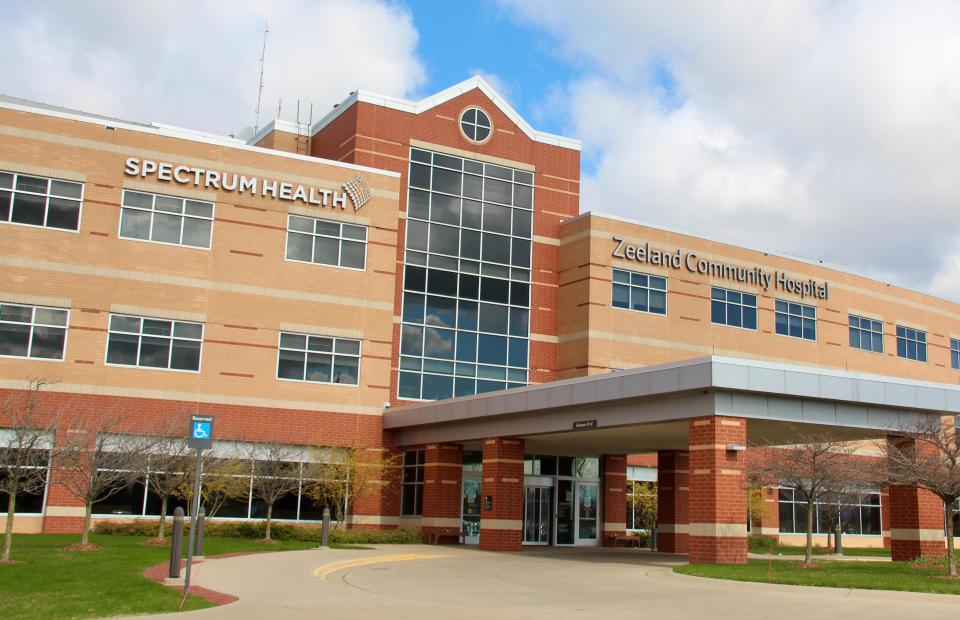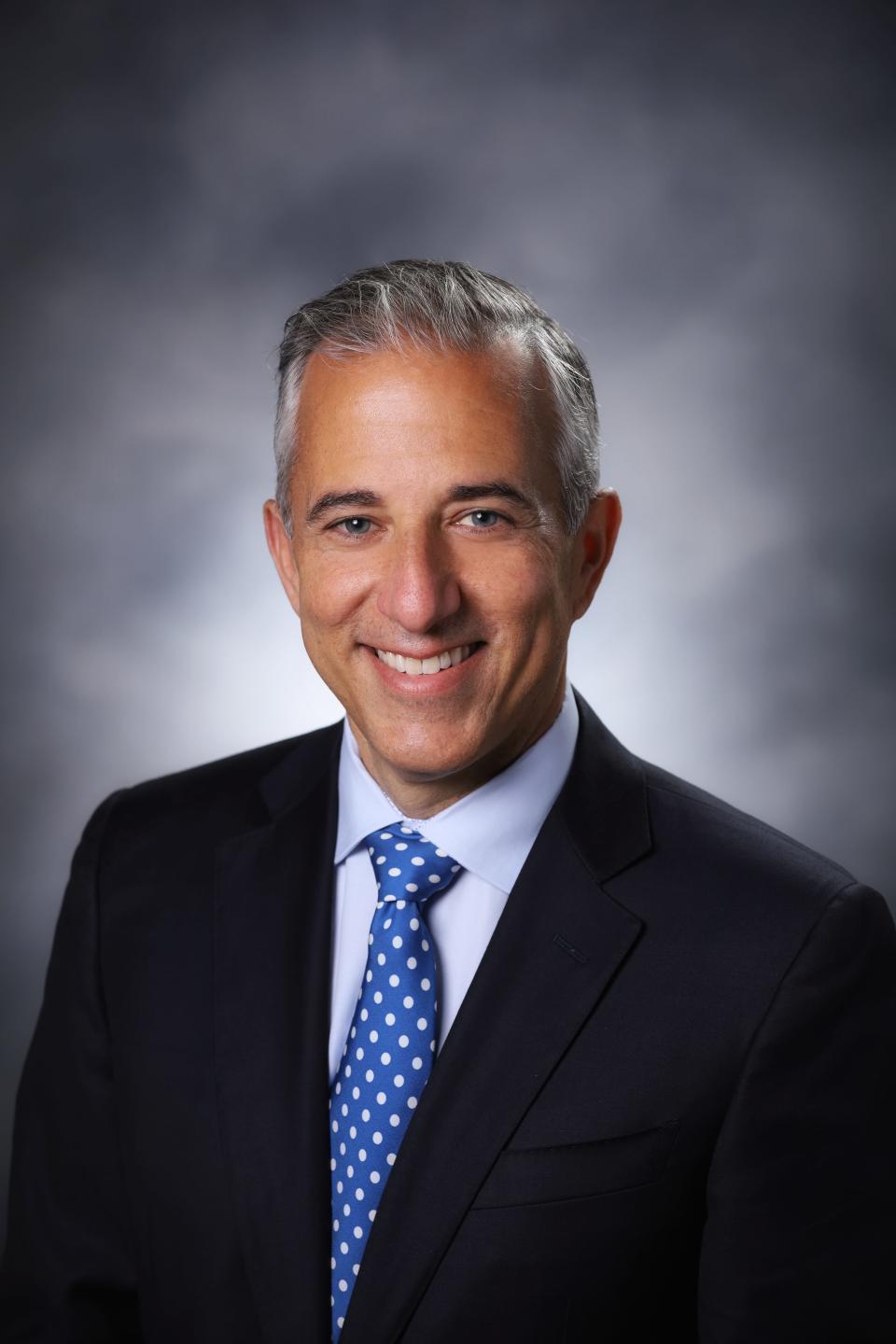West Michigan hospitals are full, reporting record numbers of COVID-19 patients
GRAND RAPIDS — West Michigan hospitals are feeling the strain of record numbers of COVID-19 patients needing care as the current virus surge in Michigan continues.
As of Dec. 3, Spectrum Health hospitals were treating 455 patients with COVID-19, more than in any earlier wave of virus cases. The hospital system's intensive care units are "beyond capacity," said Darryl Elmouchi, president of Spectrum Health West Michigan, in a joint press conference with West Michigan hospital leadership Friday.

Holland Hospital reached a record 55 patients hospitalized with the virus this week, more than double the number the hospital was caring for in mid-November when its board of directors published an open letter to the community urging the Holland area to help ease the burden of COVID-19 and other serious illnesses on the hospital.
"Every bed in our hospital is full," spokesperson Jennifer Schmitt said.
"All of our ICU beds are occupied with C patients – we have eight ICU beds."
More: West Michigan hospitals 'at a tipping point' amid rise in COVID patients
More: Letter: We are Holland Hospital and we are asking you to help us
More: Feds to send staff to Michigan hospitals to treat COVID-19 patients as pandemic rages
University of Michigan Health-West President Peter Hahn said the UMHW system hit an all-time high for COVID-19 patients last week and the hospital has been at around 90 percent capacity for months.
"This is absolutely a time of reckoning for healthcare, especially on the hospital side," Hahn said. "This prolonged delta surge combined with staffing shortages, exhaustion, it's a very difficult time, and yet I think we all hold the line for the community."
Hospitals are converting space in their buildings to care for severely-ill COVID-19 patients and other acute care patients — hospitals have also noted an increase in severe illness and conditions at their hospitals and suspect people delayed seeking care for health issues during the pandemic, one of the factors making this surge more difficult to manage than last fall's, according to hospital leadership.
Adding to the crunch is longer patient stays in the hospital — COVID-19 patients sometimes require more than two weeks' hospitalization — and difficulty in finding placements in short-term nursing facilities for patients who are ready to leave.
As the virus surge impacts most health systems in Michigan, hospitals, which typically share the load if one system is overtaxed, are being forced to halt patient transfers.
Elmouchi said Spectrum Health denied 700 transfer requests in the last several weeks because the system was at capacity.
"We've gotten these calls where they said, 'We need your help, we need a larger hospital, a higher level of care,' and we've been so full we have not been able to do that," Elmouchi said. "Historically, we accept all of those patients."

The pandemic has stretched health care systems in West Michigan "to a point that we all should be concerned," said Elmouchi. Care of both COVID-19 patients and non-COVID-19 patients is affected when hospitals are under stress, Elmouchi said.
Hospitals are canceling and delaying thousands of procedures because they do not have the staffing or beds to care for patients.
West Michigan hospital leaders continued to stress vaccination against COVID-19 as the primary way to protect the community and reduce the strain on hospitals.
Local hospital figures match state data in showing about three-quarters of patients who require hospitalization are unvaccinated, while more than 70 percent of the overall Michigan population is vaccinated.
The Michigan Health & Hospital Association found that, in Michigan hospitals, 76 percent of COVID-19 patients are unvaccinated, 87 percent of COVID-19 patients in ICUs are unvaccinated and 88 percent of COVID-19 patients on ventilators are unvaccinated.
Additionally, patients who are vaccinated but still require hospitalization are, on average, nine years older — 67 years old, on average, versus 58 years old — and have an average of four underlying conditions compared to an average of two for unvaccinated patients who require hospitalization, according to data from Spectrum Health.
Hospital leadership said the current wave is leaving health care staff exhausted and disheartened, resulting in more workers retiring and leaving the field for other jobs.

"The month of November we saw more deaths than the month of November in 2020, even though we were surging in 2020, and based on the numbers of people in our ICU and what we're seeing in the community, we anticipate that December of 2021 will probably set a sad record for the number of deaths we've seen through this entire pandemic," said Elmouchi.
"It is hard, and forgetting the challenge of caring for all those patients, the impact to all those families is unspeakable and on our team members seeing that much death, no one is prepared for that."
It's too early to tell, hospital officials said, how the current vaccines and treatments for COVID-19 will respond to the Omicron variant of the virus, recently identified as a variant of concern by the World Health Organization and quickly discovered to be spreading around the globe. Cases were identified in multiple states in the U.S. this week.
"There is certainly some assumptions being made that at this point there's already community transmission, that these weren't just necessarily cases that were transplanted from across the globe," said Matt Biersack, president of Mercy Health Saint Mary’s.
It is "too early to panic" about the arrival of Omicron, Biersack said, as reported cases of the variant caused only mild illness, but many questions about the variant have not been answered.
"Despite all this new focus on variant activity, we can't lose sight of the fact that Delta is still all around us," Biersack said. "Delta is definitely the variant of the day and nearly the exclusive cause of COVID-19 infections in our area and state."
— Contact reporter Carolyn Muyskens at cmuyskens@hollandsentinel.com and follow her on Twitter at @cjmuyskens.
This article originally appeared on The Holland Sentinel: COVID-19 surge continues to burden W. Mich. hospitals

